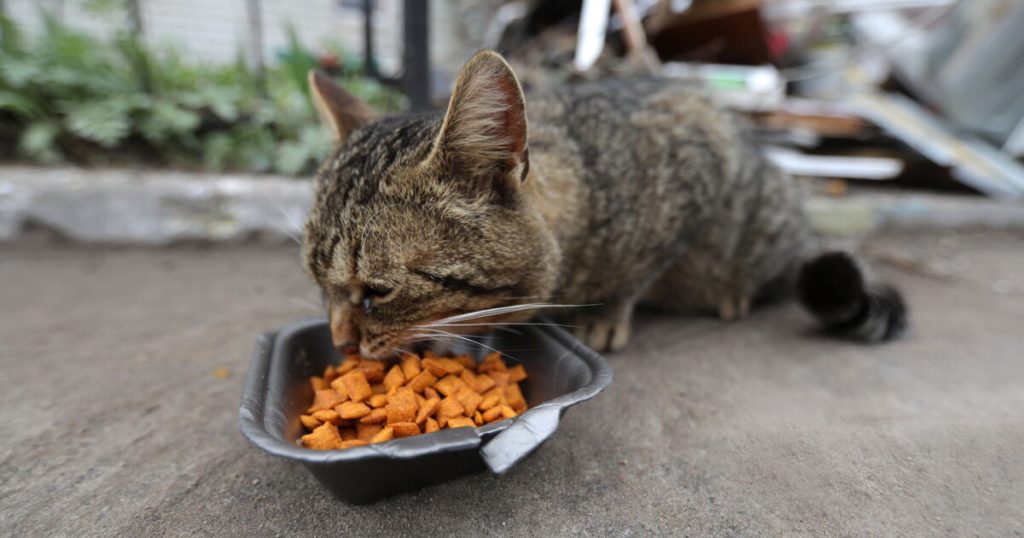
Although cats typically spend 16 hours a day sleeping, some choose to express themselves in the middle of the night. Whether out of boredom, discomfort or simply because of a bad habit, solutions exist to put an end to these inconveniences.
As soon as night falls, your cat becomes vocal. Which can be unpleasant, especially if you're trying to sleep. Please note that this is the case for many felines. Cats don't meow just because they like to do it or because they don't want to be alone. Meowing is a way for cats to communicate with us.
My cat meows at night: why?
For Marion Ruffié, feline behaviorist (founder of Absolument Chats)“we often forget that cats are nocturnal animals .” It is therefore natural for a cat to eat, play or hunt at night because this is the time when their prey leaves their hiding places. Their hunting instinct generally wakes up at the end of the day. This is the time when we can often observe the famous “fifteen minutes of madness” of cats.
According to the feline behaviorist, “Cats’ nocturnal meows are therefore often linked to hunger and lack of stimulation. If they are bored, they may meow to get your attention.
However, every cat is different, and each cat may meow for a different reason. Here are some other possible explanations:
- A feeling of worry or anxiety
Cats are sensitive to their environment. Any significant change, whether it is a move, the arrival of a new family member or changes in the daily routine, can cause a feeling of worry or anxiety in the cat, manifested by nocturnal meows.
And although cats have a reputation for being solitary and independent animals, they can feel lonely and meow for attention, especially if their daily routine is disrupted.
The age of the cat can play a determining role. An older cat may meow at night due to senility, perhaps expressing a particular need or confusion related to its health condition. Likewise, a young kitten who has just arrived may meow out of curiosity, anxiety or simply to attract attention.
If your cat is not spayed or neutered, periods of heat or the need to mark territory in both males and females can lead to nighttime meowing.
Read alsoCat: everything you need to know about sterilization
Health problems, such as pain, discomfort, can cause a cat to meow at night.
In some cases, cats develop this bad habit when they get attention or rewards in response to their meows. It is essential to understand whether the behavior is learned out of habit rather than actual necessity.
How to calm a cat that meows at night?
By identifying the cause of these nocturnal meows, it is possible to take appropriate measures to resolve this inconvenience. To soothe a cat that meows at night, follow these tips:
- If your cat meows because it is hungry
It is important to leave food available to your cat during the night, as not doing so can create anxiety and therefore discomfort leading to meowing. “Cats consume between 10 and 15 small meals per day, explains Marion Ruffié, feline behaviorist. This is why it is generally advisable to leave always food at their disposal ». And especially at night.
If you choose to ration your cat's food, consider distributing its daily ration of kibble by using an automatic dispenser or by leaving kibble free. And to avoid any risk of being overweight, “opt for a fun bowl (the cat must perform an action to have access to food, Editor's note). The games and mental stimulation associated with an interactive bowl can keep your cat busy while meeting its dietary needs. indicates Marion Ruffié.
Read alsoWhere should you place your cat's food in the house?
- If your cat meows because it is nervous, anxious
In this case, it is crucial to identify and resolve the sources of your cat's anxiety. Create a comfortable environment, with a quiet space for your pet. For the night, leave distractions available, such as interactive toys.
And just like dogs, it's important to “dedicate time to your cat through play sessions during the day or before bedtime to reduce boredom”, underlines Marion Ruffié.
Read alsoHow to make a cat tree?
- If your cat meows because of its age
Older cats, for example reaching the age of 10, may exhibit meowing due to senility. “If you don't mind your cat's presence, try leaving the bedroom door open at night. Call him gently when he meows so he feels included. Some cats take comfort in knowing that you are nearby. »
For kittens, it is advisable not to react. With time and a well-established routine, the meowing will stop: it is part of his education.
- If your cat meows at night for hormonal reasons
Spaying or neutering can often alleviate hormone-related behaviors. Consult your veterinarian to discuss the options and benefits of sterilization, especially if your cat is not already sterilized.
- If your cat meows at night because of illness or pain
Consult a veterinarian to make sure your cat is healthy. Excessive meowing can sometimes be linked to medical issues, and a professional diagnosis can help identify and treat any underlying issues.
- If your cat meows at night out of habit
If your cat meows at night out of habit, it is necessary to modify this behavior. “Ignore meowing at night and reward quietness. By stopping responding systematically, you will help discourage this behavior.” Be consistent in your approach to helping your cat adjust its behavior.
If the meowing persists, Marion Ruffié suggests not punishing your cat. Meowing in cats is a natural behavior. Punishment is a negative interaction that will cause stress. It is essential to understand the cat's underlying motivations before responding to their meows in a systematic manner.
” data-script=”https://static.lefigaro.fr/widget-video/short-ttl/video/index.js” >




